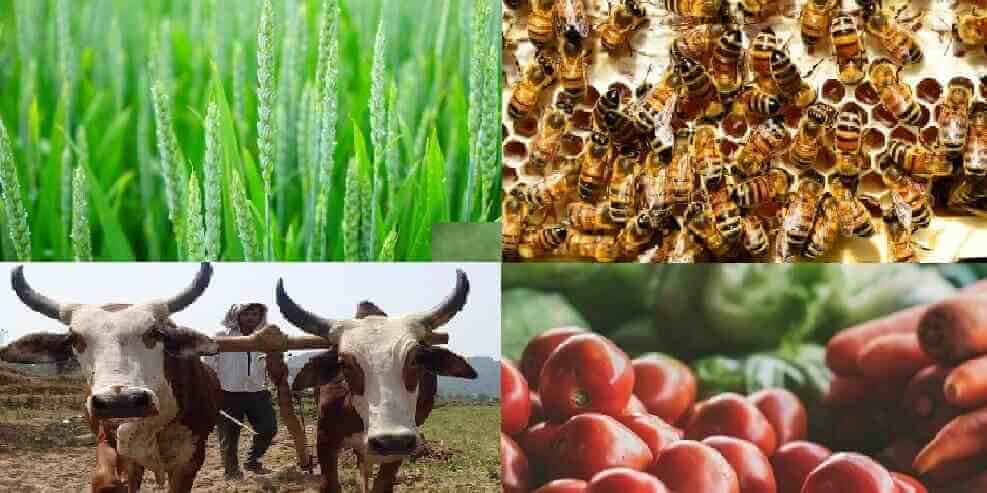Chief Minister Pema Khandu unveiled two ambitious projects to enhance the state’s agriculture and horticulture sectors: the ‘AtmaNirbhar Krishi Yojna’ for agriculture and the ‘AtmaNirbhar Bagwani Yojna’ for horticulture.
The programs are part of the AtmaNirbhar program, which was introduced during the February Budget session. The two concerned departments of Agriculture and Horticulture have been given a total of ₹ 120 crores – ₹ 60 crore for each scheme.
The Department of Agriculture’s AtmaNirbhar Krishi Yojna is a subsumed version of the previous Chief Minister’s Sashakt Kisan Yojna and Chief Minister’s Samuh Yojna, with additional emphasis and bank credit provision. likewise, the AtmaNirbhar Bagwani Yojna is the successor to the Chief Minister’s Sashakt Kisan Yojna, which is administered by the Department of Horticulture.
Also Read: Horticultural production greatest ever of 329.86mt in 2020-21, 2.93% increase
Khandu praised the departments of agriculture and horticulture, as well as the banks, for releasing detailed guidelines for the schemes, which will greatly benefit farmers and Self Help Groups (SHGs) across the state. He urged everyone to contact their respective district administrations for more information and to take advantage of the schemes.
‘These two plans are distinct in that they both rely on upfront subsidies. SBI, Arunachal Pradesh Rural Bank, and Arunachal Pradesh Cooperative Apex Bank will give credit links to the beneficiaries, according to Khandu.
He stated that land documents such as the Land Possession Certificate (LPC) will not be necessary for SHGs to participate in the initiatives. A simple certificate from the responsible EAC, CO, or BDO will suffice.
In addition, for individual plans up to ₹1.60 lakhs, there would be no security (guarantee or mortgage). For loans up to ₹10 lakhs, collateral will not be required for SHGs.
‘The best aspect is that the schemes’ components would be 45 percent government subsidy, 45 percent bank loan, and just 10% will be borne by the farmer,’ Khandu explained.
He expressed confidence that the plans will benefit the state’s 3700 SHGs, the bulk of which are made up of women.
The chief minister emphasized the importance of early implementation of the schemes because farming is seasonal, and he advised the implementing agencies not to wait for the deadlines set for processes such as beneficiary selection, etc.
The department has designated the month of September as the deadline for final beneficiary selection.
‘According to government data, we have nearly 25 million hectares of cultivable land available, but we are now only using 3.5 million. For our state to become atmanirbhar, we must make the best use of our land bank,’ he stated.
The Bagwani Yojna will focus on fruit cultivation such as apple, kiwi, orange, areca nut, walnut, and persimmon, while the Krishi Yojna will focus on scientific land terracing, rubber and tea, double cropping, FPO, buckwheat, farm mechanization, O-bollu, and apiculture, among other things.
The plans will be executed by a state-level committee led by the secretary of state, as well as district-level committees led by respective deputy commissioners. The implementing officials will be the district agriculture and horticulture officers, who would pick the districts’ beneficiaries.
The instructions for implementing the programs were created by NABCONS, NABARD’s consultancy agency.
Khandu expressed his gratitude to the banks and NABARD, saying that under the current government at the center, the Agri-Horti sector is receiving unprecedented support, particularly in the North East.
‘Recently, the Union Cabinet resurrected the North East Regional Promoting Corporation, which will assist the Northeastern states in marketing their goods. In addition, the Centre has revived the Oil Palm Mission in the region with a five-year budget of ₹11040 crores,’ he said.
In reality, the state tried to execute an oil palm program a few years ago, but it failed. About 4000 hectares of oil palm trees were planted, but the promoters were unable to develop their facilities, causing the farmers to lose money. The incentives have been quadrupled this time, according to Khandu, so promoters should be able to make a profit.
Also Read: New farm law has great potential for horticulture crops @ NHF – 2021
‘We are in contact with some of the promoters, and our goal this year is to grow at least 15000 hectares,’ he stated.
He urged deputy commissioners, particularly those in the foothills, who were virtually linked to the initiative, to investigate the feasibility of oil palm planting in their districts.
The Chief Minister said that he has offered to host the projected regional oil palm business summit at Namsai in the near future. In addition to enticing investors, he stated that the summit will also educate state farmers.



















Add Comment